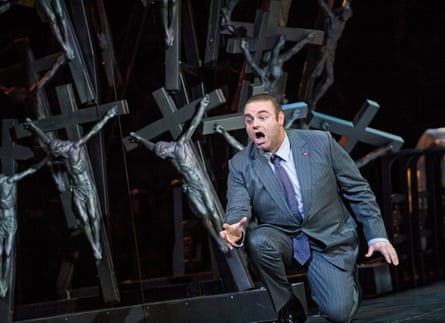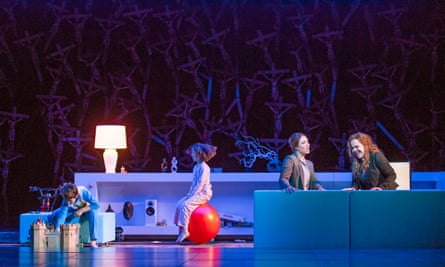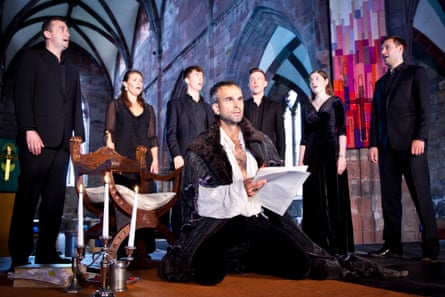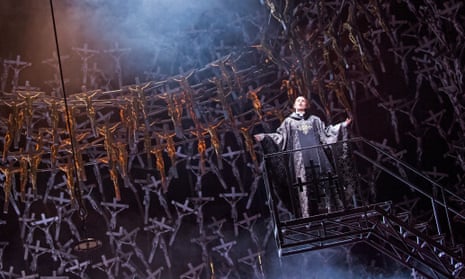“Even in death you are accursed,” roars the chorus at the end of Bellini’s Norma as the sinners are engulfed by flames. So much for redemption. Love is crushed in a tissue of lies, faith battered by edict. In this world of ancient druids and Gauls, based on a French verse poem, recreated in the ornate Italian bel canto style and, in the Royal Opera’s new production conducted by Antonio Pappano, rinsed through with Spanish Catholicism and military imagery, anything goes. The only omission is logic, but when was that the point of opera?
In the hands of Spanish-Catalan director Alex Ollé of La Fura dels Baus, who also staged the Royal Opera’s Oedipe last season, religion is at once generic and specific. A frightening thicket of tiny crucifixes, which provides the set’s main structure, suggests sacred forest, ossuary and crown of thorns. It looks spectacular, a vast, desiccated insect colony parched of life and meaning, as if God himself is dead or departed. Druids are robed in cottas and pointy capirotes, soutanes or ordinary modern suits. Pollione (Joseph Calleja), the enemy Gaul, with whom Norma (Sonya Yoncheva) is secretly in love, wears a similar grey suit. He could be on either side. Enmity, Ollé seems to remind us, comes from a habit of hatred, not from true faith.

Belief has to be suspended all round. Norma’s two illicit children reside unseen beneath the high altar in a well-appointed catacomb complete with flatscreen TV, train set and a selection of the latest gimme-gimme gizmos. Occasionally these pale-faced siblings sneak above ground for a maternal hug from their multitasking high priestess mother, who is otherwise engaged in pacifying the bellicose druids, holding off a revolt against the Romans, cutting the holy mistletoe or singing her hymn to the moon, Casta Diva, which just happens to be one of the most challenging and magnificent arias in the bel canto repertoire. Never mind, too, Norma’s clandestine affair, which turns sour when she finds her feckless squeeze has fallen for one of her own temple “virgins”: another day, another web of broken vows and deceit in the name of chastity.
This vivid but vague backdrop of religion and faith must take second place to Bellini’s prime concern, the love triangle at the heart of the opera. The most fully developed relationship is that between the heroine and her rival in love, Adalgisa (Sonia Ganassi), with whom she also shares a bond of anger and despair. Yoncheva, who replaced the originally announced Anna Netrebko several months ago in the title role, made a formidable job of her first effort. To say she has the makings of a great interpreter, following in the wake of Maria Callas or, last month in Edinburgh, Cecilia Bartoli, is to diminish her achievements here. Yoncheva showed immense vocal control, offering variety of shading and dynamic as well as a daring coarseness.
If this was because of any technical unevenness – reasonable enough in this nigh impossible role – it merely added to her convincing depiction of passion, haughtiness, fury and regret. Ganassi was warm-toned and sympathetic, excelling in her emotional Act 2 duet with Yoncheva, in which she pledges to abandon Pollione. There was potent authenticity to the sight of these two women pouring their hearts out over the kitchen counter with children in earshot, one bouncing on a spacehopper, unaware that their fate is being decided.
The part of Pollione, ultimate two-dimensional love rat that he is, makes punishing demands on the tenor, who is required to appear, leap high vocally, then exit for a long time before doing more or less the same again. Calleja, making his role debut, has a bright, jabbing quality, snapping lines and phrases early in the urgency of the moment. In Act 1 he sounded worryingly out of sorts. He recovered to give a performance of requisite sheen and shine.

David Junghoon Kim left a strong impression in the tiny role of Flavio, Pollione’s friend. The well-drilled chorus showed the full force of a crowd in judgment. Ollé, and his design team of Alfons Flores (set), Lluc Castells (costumes) and Marco Filibeck (lighting), received a mix of cheers and boos. Pappano and the orchestra allowed Bellini’s melodies to bloom spaciously but never droopily, in a performance of compelling poise and energy.
The Lammermuir festival, now in its seventh year, is still quite a well-kept secret, despite the ambitious scale of its inventive programming. It takes place in some of the churches, grand houses and other monuments of East Lothian. Last week you could hear Varèse’s Déserts with video by Bill Viola in the old Concorde hangar (now a museum of flight), a community performance of Britten’s Noye’s Fludde in Dunbar, or the music of Gesualdo in the huge parish church of Haddington.

This was the venue, too, for the aurally spectacular opening event, the Dunedin Consort and Her Majesty’s Sagbutts and Cornetts in Monteverdi’s Vespers 1610. Galleries in the church were used to recreate the all-round sound Monteverdi might have hoped for in this many-layered work. Small vocal and instrumental forces and a star lineup of soloists expert in this early 17th-century repertoire – Joshua Ellicott, Joanne Lunn, Esther Brazil and others who all deserve mention – performed electrifyingly under the penetrating guidance of the scholar-director John Butt. The serene, tugging beauty of Duo seraphim, sung from somewhere at the back of the church, hung disembodied in the air.
In the same church, using the handsome, Lammermuir-made modern organ, William Whitehead gave a recital, mainly of Bach. Whitehead is curating a project to “complete” Bach’s unfinished Orgelbüchlein, or little organ book, commissioning international composers to contribute short chorale preludes to the 164 Bach intended to write (he stopped after 46). Two of the new preludes, by Jeremy Thurlow (b1976) and Gabriel Jackson (b1962), the first jerky and exuberant, the second darker and full of conflict, were joined with a world premiere by Sally Beamish (b1956). Her short, gracious prelude is based on Ach lieben Christen, seid Getrost (Ah, dear Christians, be comforted). The chorale theme is simply stated, then decorated with delicate counterpoint, ending in mid-air, as if in serenity and discord. This festival’s subheading is “beautiful music, beautiful places”. It fulfils its promise.
Star ratings (out of 5)
Norma ★★★
Lammermuir festival ★★★★★

Comments (…)
Sign in or create your Guardian account to join the discussion